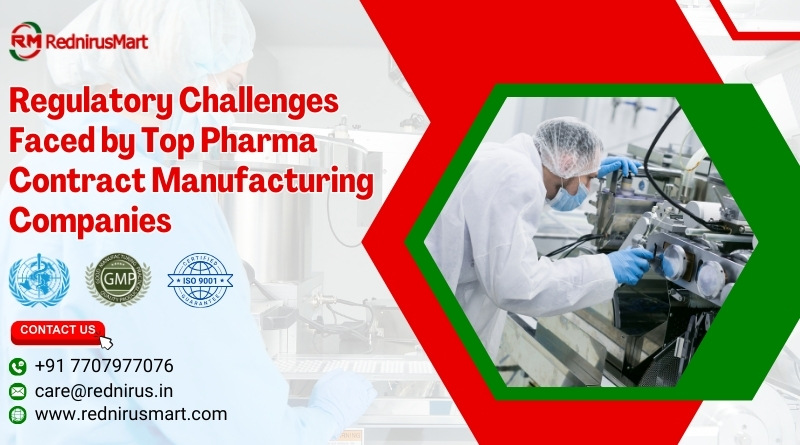Regulatory Challenges Faced by Top Pharma Contract Manufacturing Companies
Top Pharma Contract Manufacturing Companies – The pharmaceutical industry is one of the most competitive and highly regulated industries worldwide with strict regulatory requirements of safety, efficacy, and quality of medicinal products. One of the biggest concerns of the leading pharma contract manufacturing companies is the ability to interpret these regulations, which remains a tough endeavour that entails closer monitoring as well as flexibility and an understanding of both the international and national markets. This article focuses more on the regulatory issues affecting the most excellent third-party pharma manufacturing companies and their efforts to conform to the standards to offer the market the best products.
Understanding the Regulatory Landscape
International regulatory bodies including the FDA in the United States, EMA in Europe and the CDSCO in India are central in defining Standards for the production of Pharmaceuticals. They set principles of Good Manufacturing Practices (GMP) that leading pharma contract manufacturing companies have to follow. For the most prominent pharmaceutical third party manufacturing companies in India, it is not only mandatory to follow these regulations but they play a significant role in maintaining the integrity of their business and build trust among their customers and clients.
Key Regulatory Challenges
Stringent Quality Control Requirements
Maintaining quality is always a very important factor in the production of pharmaceuticals. The Best 3rd Party Pharma Manufacturing Companies in India must make sure that the production procedure follows some set standards to ensure safety and quality. This includes testing of the raw materials, during production, and testing of the final material or product. Failure to adhere to these standards risks product recalls, legal liabilities, and negative consequences to the manufacturing company’s brand image.
Constantly Evolving Regulations
Legal requirements related to the production of pharmaceutical products are always evolving and could even change periodically. Top pharma contract manufacturing has to adhere to these guidelines and make sure that their business is in compliance. This can be especially cumbersome when the business operates in different regions where the laws can be quite different. One of the prime reasons for sourcing talent from outside is the ability to react on the regulatory changes quickly enough to ensure that there is no disturbance in the continuous compliance.
Documentation and Record-Keeping
Documentation is another important aspect that should be done properly and comprehensively to meet various requirements of the regulatory bodies. This involves documentation such as batch records, quality control reports, and records on usage of raw materials. The third party pharma manufacturers at the top of the manufacturing pyramid in India spend heavily in the documentation and ensure that the entire process of manufacturing is well documented. This not only assists in ensuring compliance but also assists in making adjustments as necessary with respect to specific problems.
Audit and Inspection Readiness
The regulatory bodies also engage in assessments and examinations on a regular basis to monitor GMP compliance. It is imperative that the leading pharma contract manufacturing companies be ready for these inspections at all times. That entails internal checks, personnel education, and constant enhancement of the production line. A constant state of inspection readiness helps to reduce the likelihood of being out of compliance and improves the company’s reputation.
Managing Supply Chain Complexity
There are complex and closely-linked supplier and partner relationships throughout the manufacture of pharmaceutical products. It is very difficult to make sure every supplier you are dealing with is meeting those regulations on your behalf. Best Third Party Manufacturing Pharma Companies in India use supplier control processes and conduct periodic supplier audits to maintain high standards.
Balancing Cost and Compliance
Compliance however is important, but it can also be extremely expensive. For most of the top pharma contract manufacturing companies nowadays, it has become quite challenging to strike the right balance between compliance and costs. This very often means that new technologies and staff training as well as implementation of quality control procedures have to be paid for – which can be expensive but without which the chances of non-compliance and loss of market share are high.
Strategies for Overcoming Regulatory Challenges
To navigate these challenges, top pharma contract manufacturing companies adopt several strategies:
- Investment in Technology: The use of manufacturing technologies and automation can increase accuracy, minimize the effect of human factors, and guarantee compliance with industry guidelines.
- Continuous Training: Qualified and updated staff members are crucial in any organization and to achieve that, the staff should undergo training from time to time about the latest regulatory requirements and the best practices to follow.
- Robust Quality Management Systems: Implementing and enhancing stable and elaborate quality management systems (QMS) that incorporate management of all sub-processes of the manufacturing supply chain.
- Proactive Regulatory Monitoring: Formation of specific groups responsible for tracking legal reforms and evaluating their effects on business processes. This is because it is always easy to fix things that go wrong if the corrections are made before a lot of harm has been done.
- Collaborative Approach: Attending informational meetings of regulatory bodies, industry associations as well as learning more about the changes and trends in the industry.
Conclusion
Third Party Pharma Manufacturers – Talking about some of the most significant pharma third party manufacturing company, it can be said that the issue of regulatory compliance is constant and never-ending. Nevertheless, through adopting technology, personnel development and high-quality management systems, these companies are capable of overcoming the complicated regulatory environment. Sustaining much compliance is not only good for the public interest but also for building up trust and a believable ground in a highly competitive pharma industry. With future changes in regulations still uncertain, these pharma manufacturing third parties will also need to be strategic and responsive in their approach to compliance to guarantee that they adhere to the highest level of quality and safety.

